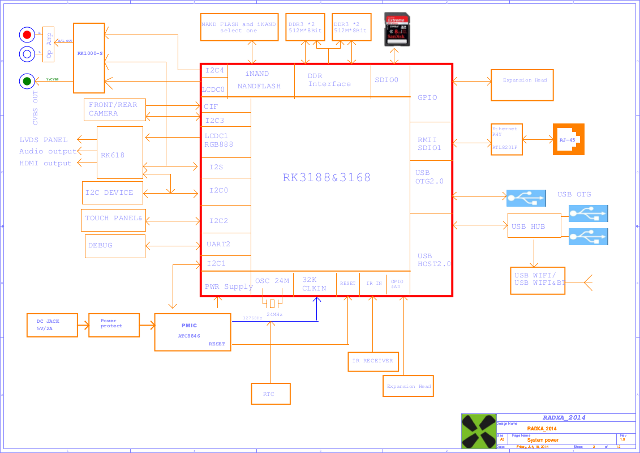Many projects claim to be “open source hardware” (OSHW) after they’ve released the schematics in PDF format, and source code. But the definition of OSHW has a few more requirements, which is practise means you’ve got to release schematics and PCB layout in the native format, not only in PDF, as well as the gerber files, and the bills of materials. Open Source Hardware can also truly be useful, if you can source the components. and for example, Broadcom BCM2835 processor might be impossible to procure, especially in small quantities, and that makes the Raspberry Pi unsuitable as an open source hardware platform. Existing companies / associations dedicated to OSHW include Arduino, Beagleboard.org, Olimex, etc.., and today Radxa has joined the club by releasing all hardware designs files for Rockchip RK3188 based Radxa Rock Pro and Lite development boards (2014 version) under a Creative Commons Attribution 4.0 International License. This could be the very first Chinese company to do so, at least for ARM development boards.
You can get the hardware design files on Radxa’s oshw repository in github. Let’s see what’s they’ve released:
- Schematics in Orcad 16.5 and PDF formats
- PCB layout (.dsn) to be open with PADS 9.5
- Manufacturing files including the Gerber files, Bill of material (BOM), components placement, etc…
- Mechanical drawings in DXF format
It looks good to me, did they forget anything?

Jean-Luc started CNX Software in 2010 as a part-time endeavor, before quitting his job as a software engineering manager, and starting to write daily news, and reviews full time later in 2011.
Support CNX Software! Donate via cryptocurrencies, become a Patron on Patreon, or purchase goods on Amazon or Aliexpress






Congratulations to Tom Cubie.
Yep – huge kudos to Cubie 师傅!
@cnx-soft i think you missed this, full TRM of rk3188 and others.
http://rockchip.fr/
It’s been in the wild for some time 🙂
what it exactly means? It will be easy to develop drivers for linux for example?
Im looking for arm htpc but on linux with optical audio (so raspberry is out of game) with hw accel.
but there are many topics about hw acceleration on arms, can anybody explain it ? Or if you have an url, i will look at it.
@newbie
It won’t affect software development. People with Radxa Rock may have an easier task when interface external hardware, but mostly it would help people do their own hardware, and use Radxa Rock as a reference point.
So if somebody wants to make a product based on Rockchip RK3188.
1. They can buy Radxa Rock boards, knowing they have documentation, source code, and hardware design files
2. While the software engineer(s) is/are developing firmware on Radxa Rock, an hardware engineer may develop a custom board based on Radxa Rock files more easily and faster than having to start from scratch.
3. The custom board is ready, and now the software developed on Radxa Rock can be run on the custom-designed board.
Electronics Engineering students may also benefit from open source hardware.
Back to your questions about “hw acceleration”, and I guess you really mean “hardware video decoding” since you want an HTPC. There are some Linux boxes with optical S/PDIF out there, for example http://www.cnx-software.com/2014/08/31/armada-mach-8-pure-linux-is-a-quad-core-xbmc-linux-tv-box/
Congratulation to radxa team!
@cnxsoft
Thanks. It was helpful
For my question… There are two types of hw accell, right?
VPU and GPU, so i would like to have an htpc, which can be able to support GPU accel in ubuntu, for example.
And have support for video acceleration in xbmc.
Armada Mach 8 looks great, but…
There isnt 1gbit lan and unclear support of CEC.
@newbie
As far as i know…. VPU is used when playing video files for “hardware video decoding”. GPU is used for 2/3D games and so.
I’ve read that VPU/GPU hw acceleration exist mostly on Android. For Linux i’ve read that there is some GPU acceleration (for Malli i think) but none VPU hw acceleration (only software) – the Wandboard comunity made an image that have some experimental os image.
I’m also interested in a good htpc with GPU/VPU hw accel. running LINUX.
@Werewolfc
the Wandboard comunity made an image that have some experimental … VPU hw decoding capabilities.
what about the software, the kernel etc, is rockchip supporting open source officially these days?
@newbie
@Werewolfc
Amlogic have GPU and VPU acceleration in Linux for XBMC, but nothing with Ubuntu
Freescale i.mx6 supports both GPU/VPU acceleration in Linux (Yocto, Ubuntu, and recently it’s been officially added to XBMC Linux)
I also understand Exynos (via Hardkernel) have both GPU and VPU acceleration in Linux (Ubuntu).
@xxiao
At least they have the rkchrome repo: https://github.com/rkchrome
@cnxsoft
The only i.mx6 dev board/mini pc that i know off is Wandboard, and it’s not stable yet. Can you give me some example of boards that have gpu/vpu hw acceleration for linux (ubuntu, arch or something else with a desktop except xbmc linux) ?
@werewolfc
+1 Same question. Please
@werewolfc
maybe with Odroid’s boards ( http://forum.odroid.com/viewtopic.php?f=8&t=1405 )
@Peter
such a shame, there isnt support of spidf audio output. (maybe external module, but it sucks)
@werewolfc
@newbie
Another solution would be Nvidia Jetson TK1. which I understand supports it all. (TBC)
Maybe Odroid-XU3 with powerful CPU/GPU fastest eMMC and USB 3.0 but lack of wifi